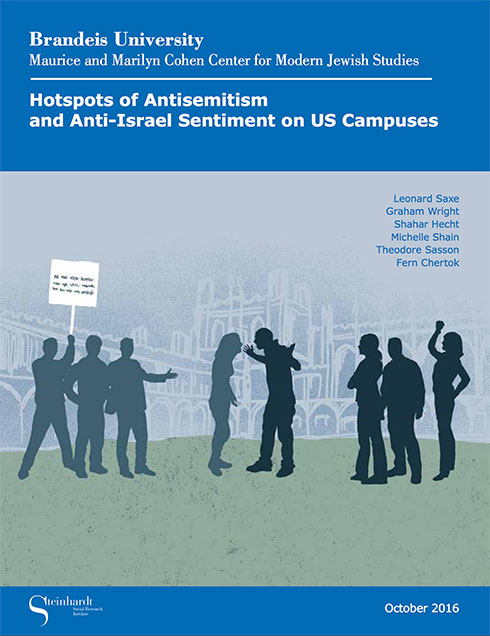Hotspots of Antisemitism and Anti-Israel Hostility on US Campuses
Leonard Saxe, Graham Wright, Shahar Hecht, Michelle Shain, Theodore Sasson, Fern Chertok
October 2016
 This report follows our 2015 study that found that a substantial portion of Jewish students reported having been exposed to antisemitism and hostility toward Israel on their campuses. Because the extent of the problem varied considerably across campuses, we attempted in this report to identify "hotspots," or campuses where antisemitism and anti-Israel sentiment were especially acute. Based on findings from a 2016 survey of Jewish undergraduates at 50 US campuses, this study also looks at the particular manifestations of hostility at different campuses and the ways in which hostile climates influence the lives of Jewish students.
This report follows our 2015 study that found that a substantial portion of Jewish students reported having been exposed to antisemitism and hostility toward Israel on their campuses. Because the extent of the problem varied considerably across campuses, we attempted in this report to identify "hotspots," or campuses where antisemitism and anti-Israel sentiment were especially acute. Based on findings from a 2016 survey of Jewish undergraduates at 50 US campuses, this study also looks at the particular manifestations of hostility at different campuses and the ways in which hostile climates influence the lives of Jewish students.
Key Findings
In terms of the variation in antisemitism and anti-Israel hostility across campuses:
- CUNY-Brooklyn, Northwestern, and many of the schools in the University of California system, are “hotspots” where the majority of Jewish students perceive a hostile environment toward Israel, and over one quarter perceive a general environment of hostility toward Jews on their campus. On these campuses it appears that the high rates of antisemitic harassment and hostility are largely driven by hostility toward Israel.
- At Wisconsin, Rutgers, and Illinois, hostility toward Jews and antisemitic harassment are relatively high but do not seem to be highly connected to criticism of Israel. At these schools, more traditional antisemitic stereotypes and tropes, rather than criticism of Israel’s politics, seem to be driving the perceived hostility toward Jews.
- There are many schools where antisemitism and hostility to Israel are negligible. Respondents at several large private universities, including U of Miami, Wash U, and Syracuse perceive very little hostility toward Israel, and virtually all of these respondents disagree that there is a hostile environment toward Jews.
- One of the strongest predictors of perceiving a hostile climate toward Israel and Jews is the presence of an active Students for Justice in Palestine (SJP) group on campus.
In terms of the relationship between hostile environments and students’ connection to Israel, the study found that:
- Even when they experience antisemitism and hostility toward Israel, students' connection to Israel remain strong. Neither the presence of an SJP group on campus nor being on a campus which is generally perceived as having a hostile environment toward Israel are related to the strength of students’ connection to Israel.
- The most Jewishly engaged students, including those who were more closely connected to Israel, are the most likely to perceive hostility toward Jews and Israel on their campus.
- Connection to Israel notwithstanding, students often feel silenced in debates about this topic. On many campuses more than one third of Jewish students feel at least a little uncomfortable expressing their opinions about the Israeli-Palestinian conflict.
- Discomfort discussing the Israeli-Palestinian conflict due to the hostility of the discourse occurs more frequently on campuses that are notable for pervasive perceptions of anti-Israel sentiment, including CUNY-Brooklyn, NYU, and the UC campuses.
- Regardless of which school students attend, and how much anti-Israel sentiment they perceive, a significant minority of Jewish undergraduates are uncomfortable expressing their opinions about the Israeli-Palestinian conflict because they feel they do not know enough to enter the conversation.